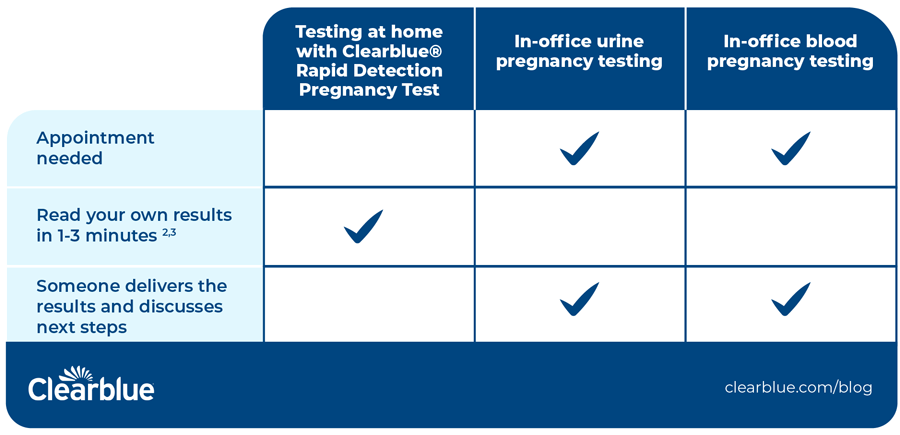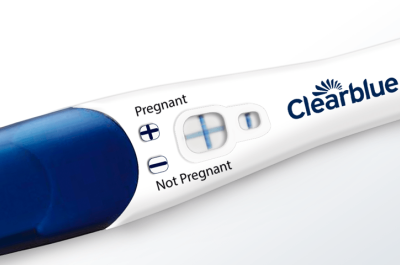In-office pregnancy testing vs. home pregnancy testing: What’s the difference?

One of the many perks of home pregnancy tests is convenience. No longer do you need to schedule a doctor’s appointment and wait hours or days for test results to confirm a pregnancy. But if your home pregnancy test is positive, you do need to schedule an appointment with a healthcare provider and the doctor may perform a urine and/or blood-drawn pregnancy test to confirm the pregnancy as well.
Here we explore the differences between home pregnancy testing and in-office pregnancy testing, and discuss the value of both experiences as important reproductive health tools. But first, let’s take a quick look at how these pregnancy testing experiences are different and similar.
Home pregnancy testing vs. in-office pregnancy testing at a glance

What is a home pregnancy testing experience like?
Most tests allow you to either place the absorbent tip directly in your urine stream or dip the tip in a collected urine sample. Follow the test’s instructions on the insert to ensure you use the test correctly.
Home pregnancy tests (also called HPTs) detect human chorionic gonadotropin (hCG), a hormone produced during pregnancy. When a fertilized egg implants into your uterine wall, the placenta begins to grow, releasing hCG into your bloodstream.4,5 Some home pregnancy tests can detect hCG in your urine six days before your missed period. For example, with the Clearblue® Early Detection Pregnancy Test , 71% of pregnancies can be detected 6 days before the missed period (5 days before the expected period).
What is an in-office urine pregnancy testing experience like?
Urine pregnancy tests (also called UPTs) conducted at a doctor’s office work just like home pregnancy tests do: They detect the presence of hCG. The main difference? Unlike a home pregnancy test, you’ll need to make an appointment with your healthcare provider, who will perform and analyze the test.
Typically, a nurse will provide you with a plastic cup with a lid. You’ll pee in the cup and then give your sample to the nurse. Just like with a home pregnancy test, you’ll know the result of a urine pregnancy test performed at the doctor’s office fairly quickly as well.
What is an in-office pregnancy blood testing experience like?
Home pregnancy tests and urine pregnancy tests at the doctor’s office are qualitative, which means they simply tell you if the hCG hormone is present or not. Blood pregnancy tests are generally quantitative. If your doctor wants to monitor your hCG levels, they will order a quantitative blood pregnancy test, which measures the amount of hCG in your blood. Most U.S. doctors monitor hCG levels if you have a history of miscarriage or you’re showing symptoms of a possible early pregnancy loss5
Blood pregnancy tests need to be analyzed and the doctor will read the results, so you may not get the results the same day.
Positive test? Call your doctor
If you’ve confirmed a pregnancy with a home pregnancy test, it’s important to call your doctor no matter where your personal journey may take you. Regardless of whether the pregnancy was unplanned or planned, you may be experiencing complicated emotions. That’s OK, and normal.
Don’t be surprised if the receptionist schedules your appointment four weeks away. For non-high-risk pregnancies, many ob-gyns ask that you wait to be seen until the second month, six to eight weeks after the start of your last period, or once you’ve had two missed periods.6 Some ob-gyns will want to see you right away, especially if you’re considered high risk due to certain health problems, advanced maternal age or have a history of miscarriage or ectopic pregnancy. In the meantime, consider taking a prenatal vitamin.
Once you do see your ob-gyn, they may still want to confirm your pregnancy with a second pregnancy test, no matter how long it’s been since your last period. This is normal, just to see the results firsthand.
Are in-office pregnancy tests more accurate?
If you are testing from the day you expect your period, all Clearblue® pregnancy tests are over 99% accurate,1 which is the same accuracy you’ll find in an in-office urine pregnancy test.
Both home pregnancy testing and in-office pregnancy testing have come a long way. In 1970, doctors were able to utilize a two-hour pregnancy test that detected hCG as “early” as four days after a missed period.7 Fifteen years later, Clearblue® introduced the Clearblue® Pregnancy Test System, the world’s first “rapid” pregnancy test giving an accurate pregnancy result — at home — in just 30 minutes. Today, Clearblue® Rapid Detection Pregnancy Test allows women to read their result as fast as one minute,3 allowing them to manage their reproductive health easily, and conveniently. And if you confirm a pregnancy at home, ob-gyns are ready to partner with you on your new path.

Looking for insights on your health journey? Clearblue® sends you curated, science-backed articles right to your inbox.
Sources and disclaimers
- Over 99% accurate from the day you expect your period. >99% accurate at detecting typical pregnancy hormone levels. Note that hormone levels vary. See insert.
- Only if you’re using Clearblue® Rapid Detection Pregnancy Test
- A pregnant result may appear in 1 minute when testing from the day of your missed period. Wait 3 minutes to confirm a not pregnant result.
- Healthwise, “Human Chorionic Gonadotropin (HCG),” (Oct. 8, 2020), University of Michigan Health, Michigan Medicine, https://www.uofmhealth.org/health-library/hw42062.
- “What is HCG?” (n.d.), American Pregnancy Association, https://americanpregnancy.org/getting-pregnant/hcg-levels/.
- “What happens during prenatal visits?” (January 31, 2017), US Department of Health and Human Services, National Institutes of Health, https://www.nichd.nih.gov/health/topics/preconceptioncare/conditioninfo/prenatal-visits/.
- “The Thin Blue Line: The History of the Pregnancy Test,” (n.d.), National Institutes of Health, office of NIH History & Stetten Museum, U.S. Department of Health and Human Services, https://history.nih.gov/display/history/Pregnancy+Test+Timeline.




